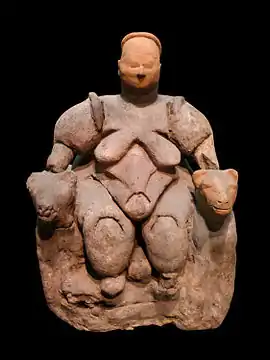Seated Woman of Çatalhöyük
The Seated Woman of Çatalhöyük (also Çatal Höyük) is a baked-clay, nude female form, seated between feline-headed arm-rests. It is generally thought[2] to depict a corpulent and fertile Mother Goddess[3] in the process of giving birth while seated on her throne, which has two hand rests in the form of feline (lioness, leopard, or panther) heads in a Mistress of Animals motif. The statuette, one of several iconographically similar ones found at the site, is associated to other corpulent prehistoric goddess figures,[4] of which the most famous is the Venus of Willendorf.

It is a neolithic sculpture shaped by an unknown artist, and was completed in approximately 6000 BC. It was unearthed by archaeologist James Mellaart in 1961 at Çatalhöyük, Turkey. When it was found, its head and hand rest of the right side were missing. The current head and the hand rest are modern replacements. The sculpture is at the Museum of Anatolian Civilizations in Ankara, Turkey.
See also
Notes
- As noted in Hugh Honour and John Fleming, A World History of Art, 2005: illustration, fig. 1.16;
- A typical assessment: "A terracotta statuette of a seated (mother) goddess giving birth with each hand on the head of a leopard, or panther from Çatalhöyük (dated around 6000 B.C.E.)" (Sarolta A. Takács, "Cybele and Catullus' Attis", in Eugene N. Lane, Cybele, Attis and related cults: essays in memory of M.J. Vermaseren 1996:376.
- So rendered in popularized accounts, such as The Oxford Companion to World Mythology, 2005: s.v. "Hittite-Hurrian mythology": "...the goddess of Çatalhöyük, her Anatolian descendants were the great Phrygian goddess Cybele, the mother of the sacrificed Attis, and the many-breasted Artemis of Ephesus."
- Noted in Honour and Fleming 2005 "Ch.1: Before History"
References
- Mellaart, James : Çatal Hüyük, A Neolithic Town in Anatolia, London, 1967
- Guide book of "The Anatolian Civilizations Museum"
- Lecture of Dr. R. Tringham, The Neolithic World of Çatalhöyük, at the University of Leuven